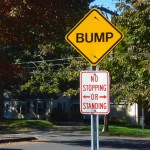Reader Question: Bumps Along The Way
 Karen sent me a question this week that hits close to home for all of us.
Karen sent me a question this week that hits close to home for all of us.
“I started taking piano lessons after a break of about 10 years. During my time off I practiced daily and even did some performing here and there. Now that I’m back to lessons and learning new things my playing seems to be getting worse. I am so discouraged. Is this normal?”
Yes Karen, it’s totally normal. When we get better we become aware of more. Details that used to go unnoticed are now obvious, in fact they stick out like sore thumbs. The end result is that we become discouraged because of things we simply never heard before. We think we have gotten worse.
Whenever you try to change an aspect of your playing, be it technical or musical, there will be some bumps along the way. If you are working on incorporating a new technique your musicality will go haywire. If you are trying to connect to emotions and character, other aspects such as notes, rhythm, and technique can all suffer. Performing anything can be really dicey for a while. You have to be diligent and, at the same time, patient with the process. You have to work in small sections.
That being said, it is important that your teacher understands this and is patient with the process too. Sometimes we teachers come across as wanting it all right now. What we are really wanting is for you to demonstrate through your playing that you know what to do in the coming week—that you understand both what is good and what needs to change.
I’ve heard the following piece of advice many times and have found it to be spot on. When you feel your playing is in a slump and you aren’t getting anywhere is the time to keep moving forward confidently, but also to be very aware of everything that is going around you both musically and elsewhere in your life. Something is about to happen. A crucial connection is near, but, you have to be open to recognizing it and allowing it to change you. If you let yourself get anxious and upset, this can’t happen and the insight will be lost.
These words come from Ben Folds via a vintage PA post, Opportunity Knocks:
Finding your Voice takes a lot of frustrating time. That’s a painful period that all artists go through, sometimes more than once… You will eventually find that it takes no effort to just be yourself, but the road to that place can be long and rough.
Be schooled in form and technique as much as you can swallow and abandon it when you feel it’s nearly killed you. Know how people did it before you… It will make you suck for a while.
Any gains you make as a musician, especially technically generally have the side effect of rendering you unfocused for a short period of time. Basically, you can expect to play and write like a goober for a while when digesting concepts. (Ben Folds)
Children generally have less trouble with the awkward stages of learning so long as we don’t get them freaked out about it. My colleague, Elena Cobb, sent me a video of a lesson with her student Kiera in which she incorporated Musical Adjectives to help her connect with the character of the pieces she is currently preparing.
Kiera’s pieces are works in progress. When she plays each the first time, most of the details are quite correct but the music does not speak. I love the way, in the “after” renditions, she goes completely for the music and is unbothered by the little bumps along the way. She, supported by her wise teacher, is confident in the fact that those can be worked out bit by bit once she knows what the music is about.
My undergraduate teacher used to use the following statement a lot in lessons, “I don’t care about the (notes, rhythm, technique, or ???) just let me hear the __________.” Clever man. He gave me a focus with permission to make mistakes—to play like a goober—on the way to deeper understanding and the ability to let the music speak.



Where the teacher helps is in spotting the small mistakes that you might notice.
Teacher’s also force us to do what we tend to not want to do: focus on the part we are having difficulty. Play it until we hear in our sleep.
They know the reward of a well played piece is worth the effort.